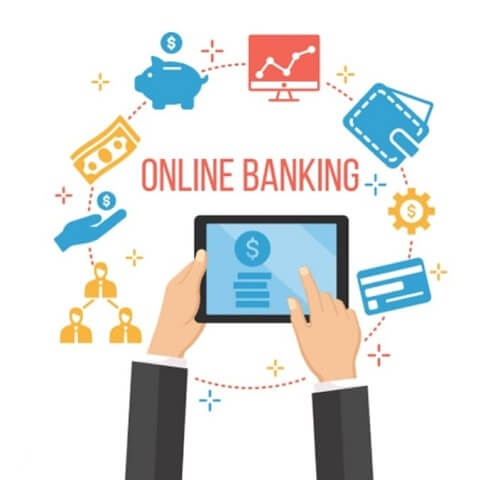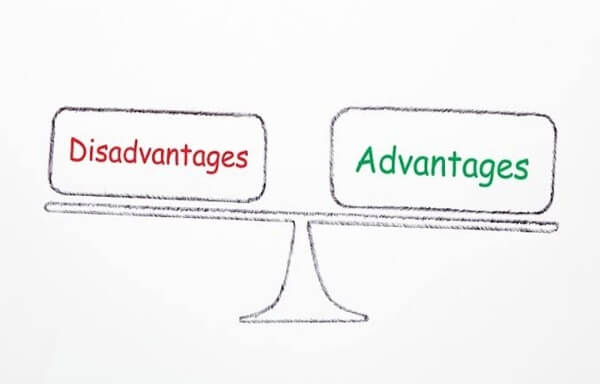Advantages and Disadvantages of Online BankingChoosing between conventional and internet banking is the first step in deciding where to bank. Find out the advantages and disadvantages of online banking. You may now conduct your banking without ever leaving your house thanks to the continuous growth of internet banking, commonly known as online banking. Online banks provide a tonne of additional benefits in addition to conveniences, such as greater interest rates and fewer costs. Understanding the kind of institution you want is the first step in choosing a bank. For instance, which would you prefer: a bank you can visit in person with access to ATMs, or a fully online or mobile-based alternative? Although online banks and physical banks have many things in common, there are also some significant distinctions. Continue reading to learn more about the advantages and disadvantages of online banking if you're still unsure. 
Online Banking: What is it?Let's start with the fundamentals. You may manage your bank account information online using a computer or mobile phone and online banks don't have physical locations. Customers may perform a variety of financial operations using online banking services, including electronic bill payment, check deposit, and money transfers (sometimes called bill pay). While online banks primarily provide mobile access, traditional banks and credit unions with branches often permit consumers to check their account statements (or e-statements) online as well. You won't really interact with a banker, but you can access your account whenever you want using a computer or mobile device. 
Advantages of Online Banking1. Higher Rates Rates at online banks are often higher than at traditional banks. Internet banks are able to provide the best interest rates for checking and savings accounts because they don't have to spend money on maintaining physical premises. For instance, the top online savings accounts provide APYs of about 1.50%. When compared to the national average savings rate of 0.05%, some of the biggest brick-and-mortar banks offer savings accounts that only yield 0.01% APY, a discrepancy that may quickly grow when an account balance is substantial. The majority of internet banks now provide certificates of deposit (CDs), many of which have no early withdrawal penalties. 2. Lower Fees The fact that online banks often charge minimal or no fees is another benefit of not having to bother about branch maintenance. This implies that you will be less likely to incur monthly service costs, overdraft fees, or fees related to using a debit card or check as a form of payment, to mention a few. Comparatively, major physical banks sometimes charge monthly service fees for accounts, but they could eliminate them if you satisfy certain criteria, such as maintaining a required minimum balance. 3. Environmentally Preferable Online banking greatly minimises the usage of paper because you receive all banking correspondence via email or text. A USB stick makes data storage and management simple, as does virtually storing data in the "cloud." Additionally, if you need to produce records for tax purposes, you can easily access this information. So when it comes to doing your part to protect the environment, you can feel good about banking online. 4. Accessibility While traditional banking hours aren't always convenient, online banking allows you to access your accounts and bank services whenever you need them on a computer or mobile device, anywhere there is an internet connection. Customer care is also accessible by phone, frequently around-the-clock, seven days a week. 5. Simple and Quick Transactions In terms of speedy money transfers and deposits, online banks do better than traditional banks. You may deposit cheques using an application and transfer funds from another checking account to your online bank without having to search for and visit an ATM. Disadvantages of Online Banking1. No Actual Branches The workers at your local branch may be spoken with directly when you use a traditional bank. If and when you require extra financial services, such as a loan, or when you must modify your banking arrangements, that can be a benefit. In addition, many conventional banks offer current clients special deals on credit cards, vehicle loans, and mortgages. With an online bank, you'll probably have less access to in-person assistance and fewer chances to form those interpersonal bonds. 2. Tech-Related Service Disruptions We are dependent on the reliability and effectiveness of the system whenever we utilise computers or an internet connection. If your internet service is delayed or unavailable for a while, it will obviously limit your ability to access accounts online. Similarly, you won't be able to access your banking information over the internet or a mobile device if the bank's servers crash or become momentarily inaccessible as a result of planned site maintenance. 3. Concerns about Identity Theft and Security In general, internet banking platforms and mobile applications should be secure because banks frequently install new security measures. However, neither system is completely safe, and hacked accounts can result in identity theft due to stolen login credentials. Therefore, even if you may generally use mobile or online banking with confidence, be cautious to avoid using insecure networks, change passwords frequently, and safeguard your login information. 4. Deposit Restrictions Individuals, particularly enterprises, may find it challenging to make significant online deposits due to daily or monthly mobile deposit restrictions. Once you've spent your allotted amount, you'll need to make the trip to a bank to make a deposit. Additionally, not all check types can be read by computer scanning software with ease. For instance, handwritten company checks with a black line on the back to create a carbon copy in an account register would not be accepted by the internet deposit system, necessitating an on-site deposit. 5. Faster is Not Always More Convenient Even while it can just take a few seconds to deposit a check using a bank's mobile app, you still have to wait before your money is available. Online banking is convenient in that it saves time on travel and line waiting at branches, but depending on the amount placed, it might take up to three business days for all deposits to be reviewed and monies to be made available for access. 6. No Relationship with a Personal Banker You might be able to take care of your everyday banking requirements on your own for the most part. However, it could be more challenging to address concerns if you don't have personal contact with a banker when problems emerge. While customer service departments are available on online banking sites, you frequently have to navigate a phone tree and wait on hold before interacting with someone who is unfamiliar with your requirements or financial history. Local banker, on the other hand, is driven to help their clients and develop their personal ties. 7. Limited Services Scope Even while you may do quite a bit with a banking account, including such make payments, checking balances, and making payments, there are many limits on the types of facilities you may access. You might be able to submit an initial application for a new account, a loan, or a mortgage online, but you will often need to go to a branch to sign documents and provide identification. Similarly to this, even if you may transfer funds to a checking account or debit card to make purchases, you'll need to go to a branch office or an ATM close by if you need cash. 8. Possibility of Overspending Some people could exceed their checking account limitations as a result of being able to check account balances on the spur of the moment. The account balance might not accurately reflect your true available funds unless you carefully review your chequebook or a list of debit transactions that were not cleared. If you don't keep a close eye on all of your transactions, overdrafts and fees may happen. ConclusionMobile banking offers a plethora of benefits, one of which is the potential annual savings of up to 26 hours. In addition, a number of large banks, like Wells Fargo, have provided financial guidance to their customers via their mobile applications, allowing them to save more time and hand off the entire task to the computer. There is no calculating or paper clutter because everything you require is just a click or two away. Considering everything, adopting mobile banking is a huge step forward for everyone who deals with money on a regular basis, from casual grocery shoppers to stock dealers. Mobile banking does really include security flaws and vulnerabilities. However, the concept has potential, and thousands of individuals throughout the globe have used it effectively. |
 For Videos Join Our Youtube Channel: Join Now
For Videos Join Our Youtube Channel: Join Now
Feedback
- Send your Feedback to [email protected]
Help Others, Please Share









